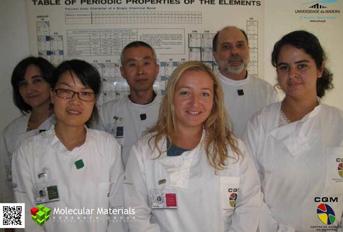Associação Portuguesa de Investigação em Cancro
Madeira Chemistry Research Centre develops nanogels for the delivery of anticancer drugs
Madeira Chemistry Research Centre develops nanogels for the delivery of anticancer drugs

The Molecular Materials Research Group from the Madeira Chemistry Research Centre (CQM, http://cqm.uma.pt/, http://www3.uma.pt/jrmmrg), University of Madeira, is developing work in the area of the synthesis of dendrimeric and polymeric materials for applications in Nanomedicine (drug/ gene delivery). This time, the group, in collaboration with colleagues from Donghua University, Shanghai, China, developed alginate-based nanogels capable of transporting drugs into the cancer cells and release them in response to specific environmental stimuli (a reductive chemical environment). These nanogels, when used as carriers for doxorubicin (a standard anti-cancer drug), showed a toxicity remarkably higher than that shown by the drug alone. On the one hand, the use of nanogels is a way to reduce the resistance to doxorubicin, and on the other hand, may allow the future use of this drug at lower concentrations, thereby helping to reduce the side effects of the treatment. This new approach is likely to be applied to other drugs, including those which are difficult to solubilize in water.
Authors and affiliations:
Dina Maciel1, Priscilla Figueira1, Shili Xiao1, Dengmai Hu2, Xiangyang Shi1,2,3, João Rodrigues1, Helena Tomás *1, and Yulin Li *1
1. CQM − Centro de Química da Madeira, MMRG, Universidade da Madeira, Campus Universitário da Penteada, 9020-105 Funchal, Portugal
2. State Key Laboratory for Modification of Chemical Fibers and Polymer Materials, College of Materials Science and Engineering, Donghua University, Shanghai 201620, People’s Republic of China
3. College of Chemistry, Chemical Engineering, and Biotechnology, Donghua University, Shanghai 201620, People’s Republic of China
Abstract:
Although doxorubicin (Dox) has been widely used in the treatment of different types of cancer, its insufficient cellular uptake and intracellular release is still a limitation. Herein, we report an easy process for the preparation of redox-sensitive nanogels that were shown to be highly efficient in the intracellular delivery of Dox. The nanogels (AG/Cys) were obtained through in situ cross-linking of alginate (AG) using cystamine (Cys) as a cross-linker via a miniemulsion method. Dox was loaded into the AG/Cys nanogels by simply mixing it in aqueous solution with the nanogels, that is, by the establishment of electrostatic interactions between the anionic AG and the cationic Dox. The results demonstrated that the AG/Cys nanogels are cytocompatible, have a high drug encapsulation efficiency (95.2 ± 4.7%), show an in vitro accelerated release of Dox in conditions that mimic the intracellular reductive conditions, and can quickly be taken up by CAL-72 cells (an osteosarcoma cell line), resulting in higher Dox intracellular accumulation and a remarkable cell death extension when compared with free Dox. The developed nanogels can be used as a tool to overcome the problem of Dox resistance in anticancer treatments and possibly be used for the delivery of other cationic drugs in applications beyond cancer.
Journal:
Biomacromolecules, 2013, 14 (9), pp 3140–3146
DOI: 10.1021/bm400768m
Link:
http://pubs.acs.org/doi/abs/10.1021/bm400768m




